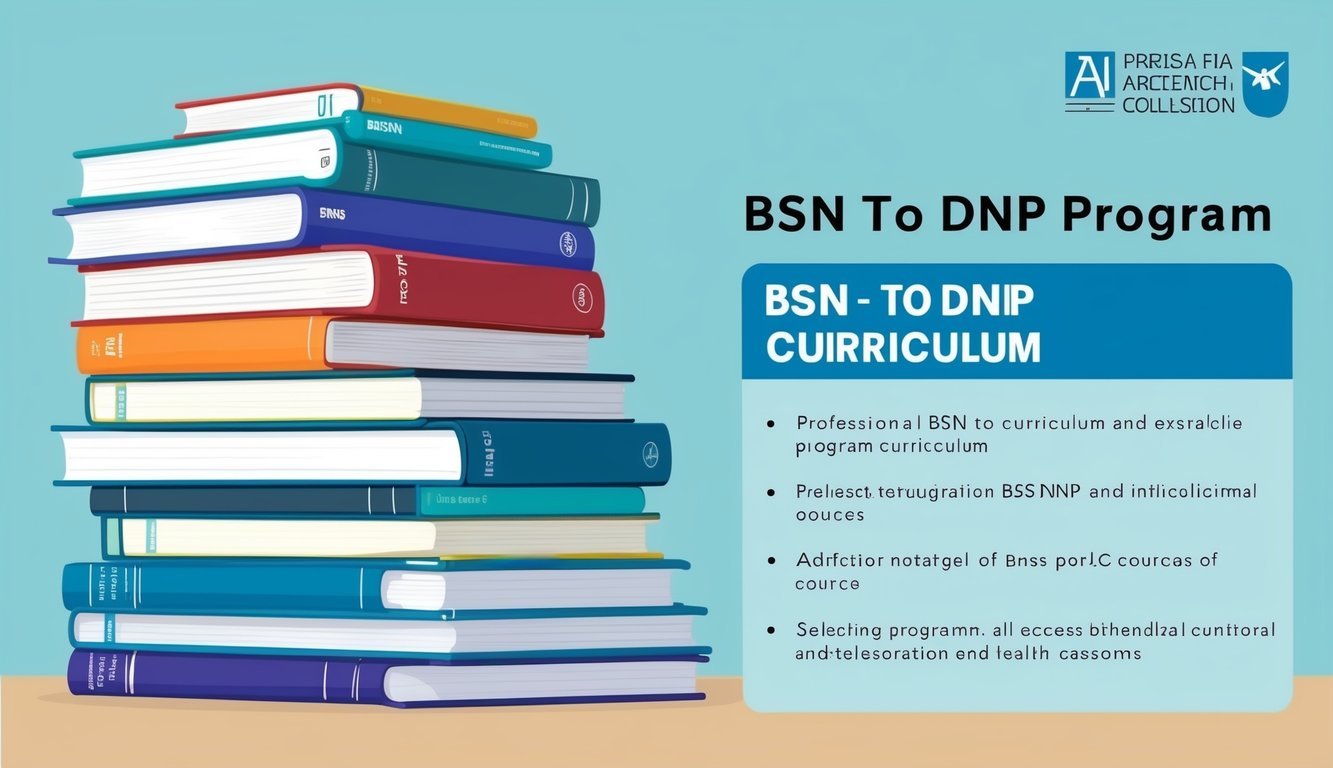As a registered nurse with a Bachelor of Science in Nursing (BSN), you may be considering the next step in your career.
Pursuing a Doctor of Nursing Practice (DNP) can be an excellent option, providing you with advanced nursing practice skills and the opportunity to take on leadership roles in healthcare. BSN to DNP programs are designed to streamline this transition, allowing you to earn your doctorate while building on your existing knowledge and skills.
These programs typically offer various specializations, enabling you to focus on areas such as nurse practitioner roles, health informatics, or healthcare leadership.
Many schools offer flexible online options, making it easier to balance your studies with professional and personal commitments.
For instance, programs like Maryville University’s BSN-DNP can be completed in as little as 40 months and are entirely online.
The advantages of enrolling in a BSN to DNP program are significant.
With a DNP, you’ll be equipped to enhance patient care, influence health policy, and contribute to the advancement of nursing practice.
As you explore these important programs, consider how a DNP can not only elevate your career but also enable you to make a lasting impact in the healthcare field.
Understanding BSN to DNP Programs
BSN to DNP programs offer an advanced educational pathway for registered nurses seeking to enhance their skills and career opportunities.
These programs bridge the gap between a Bachelor of Science in Nursing (BSN) and a Doctor of Nursing Practice (DNP), focusing on advanced clinical practice, leadership, and healthcare policy.
The Transition from BSN to DNP
Transitioning from a BSN to a DNP program typically involves several key components.
The curriculum usually includes both theoretical courses and practical clinical experiences.
Students strengthen their foundation in nursing while acquiring advanced skills essential for practice.
Most programs require BSN graduates to complete core courses in areas like:
- Healthcare Policy
- Evidence-Based Practice
- Advanced Pathophysiology
Some institutions offer flexible online options, allowing you to manage work and studies simultaneously.
Programs often include hands-on clinical experiences to prepare you for real-world applications in complex healthcare environments.
For more details on specific programs, you may refer to NurseJournal.
Advantages of Pursuing a DNP Degree
Pursuing a DNP degree provides numerous benefits that can significantly impact your nursing career.
DNP programs prepare you for advanced roles in clinical practice, leadership, and education.
Here are some advantages to consider:
- Increased Autonomy: DNP graduates can often take on more independent roles within healthcare settings, such as Nurse Practitioners (NPs).
- Higher Earning Potential: Salaries for DNP graduates tend to be higher compared to those with just a BSN or MSN. In states like Alabama and New York, DNP nurses earn competitive hourly rates.
Additionally, a DNP degree positions you to influence healthcare policy and practice on a broader scale.
Many employers now prefer or require a DNP for leadership roles, making it a valuable investment in your future.
Scope of Practice for DNP Graduates
The scope of practice for DNP graduates encompasses a variety of roles in the healthcare system.
With this advanced degree, you can specialize in areas such as:
- Nurse Practitioner
- Clinical Nurse Specialist
- Healthcare Administrator
DNP graduates enjoy extensive autonomy in their practice.
They can diagnose and treat medical conditions, prescribe medications, and lead healthcare teams.
As a DNP, you may also engage in research and policy development, impacting healthcare delivery at local, state, or national levels.
Program Structure and Curriculum

Understanding the program structure and curriculum of BSN to DNP programs is essential in preparing for your advanced nursing education.
The following subsections detail the curriculum components, available specializations, and the differences between online and on-campus programs.
Curriculum Components
The curriculum for BSN to DNP programs typically includes core courses in Advanced Nursing Science, which cover topics such as health assessment, pathophysiology, and pharmacology.
You will also engage in Research methodologies that prepare you for evidence-based practice.
Most programs require a Scholarly Project, allowing you to apply theoretical knowledge to real-world healthcare challenges.
In addition, clinical hours are a crucial component, providing hands-on experience in your chosen field.
For example, the Ohio State University program combines coursework with clinical training over three to four years, depending on your study pace.
| Curriculum Components | Description |
|---|---|
| Core Nursing Courses | Advanced practice and theoretical knowledge |
| Research Methodologies | Evidence-based practice preparation |
| Clinical Experience | Hands-on training and patient care |
| Scholarly Project | Practical application of learned concepts |
Specializations and Concentrations
Most BSN to DNP programs offer a variety of Specializations to tailor your education to your career goals.
Common areas include Family Nurse Practitioner, Psychiatric-Mental Health Nurse Practitioner, and Clinical Nurse Specialist.
Each specialization emphasizes different skill sets and clinical practices.
You can select programs like the one at Maryville, which offers five different NP concentrations and can be completed online in as little as 40 months.
It allows you to focus your studies on areas that align with your interests and career aspirations.
Online versus On-Campus Programs
When considering BSN to DNP programs, it’s crucial to evaluate the differences between Online DNP Programs and traditional on-campus options.
Online programs, such as the distance-based learning offered by Duke University, provide flexibility, enabling you to continue working while studying.
You will complete clinical experiences locally, making it easier to integrate your education into your current lifestyle.
On-campus programs may offer more direct access to faculty and networking opportunities but often require commuting.
Each format has benefits based on your personal circumstances, learning preferences, and professional commitments.
Consider what aligns best with your educational and career goals before making a decision.
Admission and Program Requirements
Navigating the admission process for BSN to DNP programs involves understanding several critical components.
Below are the eligibility criteria, application materials needed, and selection criteria used by many programs.
Eligibility and Prerequisites
To apply for a BSN to DNP program, you typically need to meet specific eligibility requirements.
Most programs require you to possess a Bachelor of Science in Nursing (BSN) from an accredited institution.
You must hold a valid Registered Nurse (RN) license in your state.
Additionally, many programs have a minimum GPA requirement, often around 3.0 on a 4.0 scale.
Some programs may also require completion of certain prerequisite courses, so checking individual program details is essential.
Application Materials
When applying, you will need to gather various documents to submit with your application.
Common materials include:
- Transcripts: Official transcripts from all post-secondary education.
- Letters of Recommendation: Typically, two to three recommendation letters from professional or academic references.
- Personal Statement: A concise statement explaining your interest in the program, career goals, and relevant experiences.
- GRE Scores: Some programs may require Graduate Record Examination (GRE) scores, while others have made this optional or do not require it at all.
Review each program’s specific requirements, as they can differ significantly.
Criteria for Selection
Admission committees assess several factors when selecting candidates.
These may include:
- GPA: A cumulative GPA is a critical factor, with most programs looking for a minimum of 3.0.
- Experience: Your nursing experience and any leadership roles can enhance your application.
- Personal Statement: This document provides insight into your motivations and suitability for the program.
- Letters of Recommendation: Strong letters from credible sources can positively influence your application.
Understanding these selection criteria allows you to strengthen your application effectively.
For more detailed information, consider reviewing specific program guidelines, such as those from Duke University School of Nursing or the University of Florida.
Career Outcomes and Professional Growth

Pursuing a BSN to DNP program opens significant avenues for career advancement and professional development in healthcare.
You will find opportunities in advanced practice roles, gain leadership skills, and contribute positively to patient outcomes.
Advanced Practice Roles
Transitioning from a BSN to a Doctor of Nursing Practice (DNP) equips you for various advanced practice roles, including becoming a Nurse Practitioner.
In these positions, you can diagnose and treat illnesses, order diagnostic tests, and manage treatment plans.
Many states require DNP graduates to obtain board certification, which enhances your qualifications.
Advanced Practice Registered Nurses (APRNs) often enjoy higher salaries compared to their BSN counterparts, with DNP holders regularly earning salaries around $110,000 to $130,000 annually, depending on the specialty and region.
Leadership in Healthcare Organizations
A DNP program focuses heavily on developing your leadership capabilities within healthcare organizations.
You will acquire skills related to health care policy, systems leadership, and evidence-based practice.
These are essential for influencing change at various levels of the healthcare system.
As a DNP graduate, you can take on leadership roles such as nursing director, clinical manager, or chief nursing officer.
This level of leadership enables you to drive initiatives that improve care delivery and operational efficiency while mentoring the next generation of nurses in clinical environments.
DNP Impact on Patient Outcomes
Your journey from BSN to DNP has a direct correlation with improved patient outcomes.
DNP-prepared nurses apply evidence-based practice to enhance care quality and safety in clinical settings.
Research shows that organizations led by Doctorally prepared nurses report lower rates of hospital-acquired infections and improved patient satisfaction.
Furthermore, DNP graduates are often involved in quality improvement projects, focusing on reducing readmission rates and enhancing chronic disease management.
These contributions are critical for advancing care standards and ensuring better health results for patients, which can also lead to increased healthcare organization performance.
Accreditation and Academic Standards

Accreditation plays a crucial role in ensuring that nursing programs meet high academic standards.
Understanding its importance and how to evaluate program quality will help you make informed decisions regarding your educational journey.
Importance of Accreditation
Accreditation validates the quality and integrity of a nursing program.
Recognized bodies, such as the Commission on Collegiate Nursing Education (CCNE) and the Accreditation Commission for Education in Nursing (ACEN), accredit programs that comply with established educational standards.
By choosing an accredited university, you can be confident that the curriculum aligns with the DNP Essentials, which outline essential competencies for advanced nursing practice.
Accreditation also fosters ethical practices and ensures that educational institutions provide a supportive learning environment.
Evaluating Program Quality
When evaluating the quality of a BSN to DNP program, consider the following factors:
| Factor | Description |
|---|---|
| Accreditation Status | Check if the program is accredited by CCNE or ACEN. |
| Curriculum | Ensure it covers critical areas such as healthcare policy and evidence-based practice. |
| Faculty Qualifications | Look for faculty with advanced degrees and relevant experience. |
| Student Outcomes | Research graduation rates, job placement, and licensure exam pass rates. |
Review the AACN resources for insights into academic quality and the standards necessary for a successful nursing career.
Focus on programs that emphasize continuous improvement and community engagement in curriculum development.
This will guarantee that you receive a comprehensive education that prepares you for advanced practice roles.

